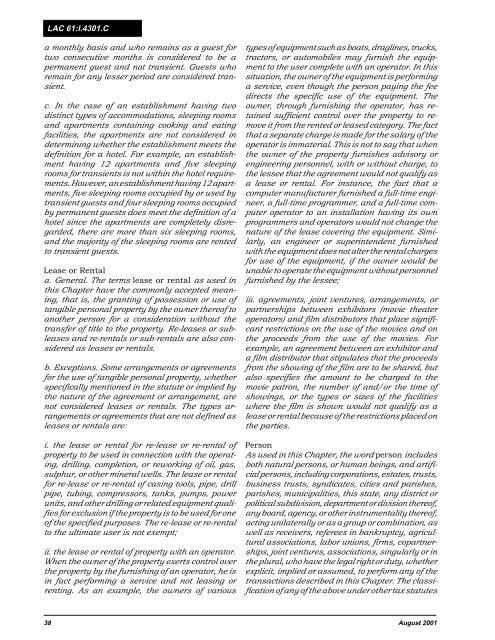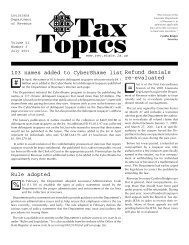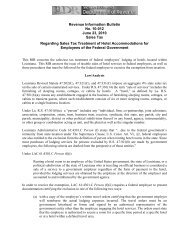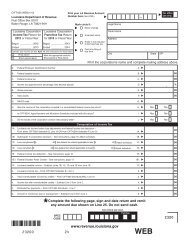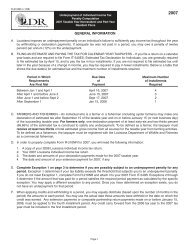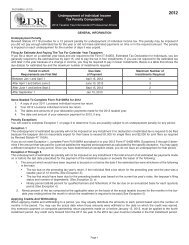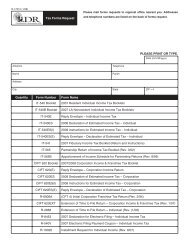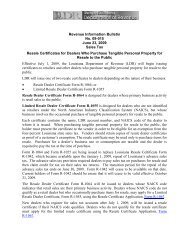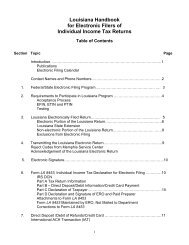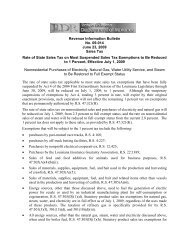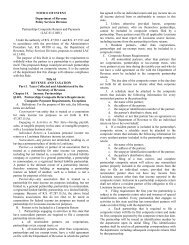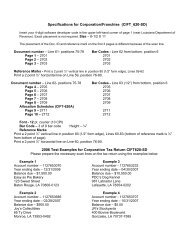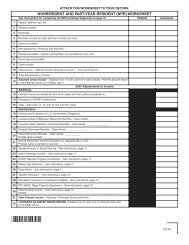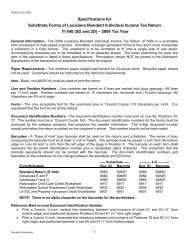Sales Tax Statutes and Regulations - Louisiana Department of ...
Sales Tax Statutes and Regulations - Louisiana Department of ...
Sales Tax Statutes and Regulations - Louisiana Department of ...
Create successful ePaper yourself
Turn your PDF publications into a flip-book with our unique Google optimized e-Paper software.
LAC 61:I.4301.C<br />
a monthly basis <strong>and</strong> who remains as a guest for<br />
two consecutive months is considered to be a<br />
permanent guest <strong>and</strong> not transient. Guests who<br />
remain for any lesser period are considered transient.<br />
c. In the case <strong>of</strong> an establishment having two<br />
distinct types <strong>of</strong> accommodations, sleeping rooms<br />
<strong>and</strong> apartments containing cooking <strong>and</strong> eating<br />
facilities, the apartments are not considered in<br />
determining whether the establishment meets the<br />
definition for a hotel. For example, an establishment<br />
having 12 apartments <strong>and</strong> five sleeping<br />
rooms for transients is not within the hotel requirements.<br />
However, an establishment having 12 apartments,<br />
five sleeping rooms occupied by or used by<br />
transient guests <strong>and</strong> four sleeping rooms occupied<br />
by permanent guests does meet the definition <strong>of</strong> a<br />
hotel since the apartments are completely disregarded,<br />
there are more than six sleeping rooms,<br />
<strong>and</strong> the majority <strong>of</strong> the sleeping rooms are rented<br />
to transient guests.<br />
Lease or Rental<br />
a. General. The terms lease or rental as used in<br />
this Chapter have the commonly accepted meaning,<br />
that is, the granting <strong>of</strong> possession or use <strong>of</strong><br />
tangible personal property by the owner there<strong>of</strong> to<br />
another person for a consideration without the<br />
transfer <strong>of</strong> title to the property. Re-leases or subleases<br />
<strong>and</strong> re-rentals or sub-rentals are also considered<br />
as leases or rentals.<br />
b. Exceptions. Some arrangements or agreements<br />
for the use <strong>of</strong> tangible personal property, whether<br />
specifically mentioned in the statute or implied by<br />
the nature <strong>of</strong> the agreement or arrangement, are<br />
not considered leases or rentals. The types arrangements<br />
or agreements that are not defined as<br />
leases or rentals are:<br />
i. the lease or rental for re-lease or re-rental <strong>of</strong><br />
property to be used in connection with the operating,<br />
drilling, completion, or reworking <strong>of</strong> oil, gas,<br />
sulphur, or other mineral wells. The lease or rental<br />
for re-lease or re-rental <strong>of</strong> casing tools, pipe, drill<br />
pipe, tubing, compressors, tanks, pumps, power<br />
units, <strong>and</strong> other drilling or related equipment qualifies<br />
for exclusion if the property is to be used for one<br />
<strong>of</strong> the specified purposes. The re-lease or re-rental<br />
to the ultimate user is not exempt;<br />
ii. the lease or rental <strong>of</strong> property with an operator.<br />
When the owner <strong>of</strong> the property exerts control over<br />
the property by the furnishing <strong>of</strong> an operator, he is<br />
in fact performing a service <strong>and</strong> not leasing or<br />
renting. As an example, the owners <strong>of</strong> various<br />
types <strong>of</strong> equipment such as boats, draglines, trucks,<br />
tractors, or automobiles may furnish the equipment<br />
to the user complete with an operator. In this<br />
situation, the owner <strong>of</strong> the equipment is performing<br />
a service, even though the person paying the fee<br />
directs the specific use <strong>of</strong> the equipment. The<br />
owner, through furnishing the operator, has retained<br />
sufficient control over the property to remove<br />
it from the rented or leased category. The fact<br />
that a separate charge is made for the salary <strong>of</strong> the<br />
operator is immaterial. This is not to say that when<br />
the owner <strong>of</strong> the property furnishes advisory or<br />
engineering personnel, with or without charge, to<br />
the lessee that the agreement would not qualify as<br />
a lease or rental. For instance, the fact that a<br />
computer manufacturer furnished a full-time engineer,<br />
a full-time programmer, <strong>and</strong> a full-time computer<br />
operator to an installation having its own<br />
programmers <strong>and</strong> operators would not change the<br />
nature <strong>of</strong> the lease covering the equipment. Similarly,<br />
an engineer or superintendent furnished<br />
with the equipment does not alter the rental charges<br />
for use <strong>of</strong> the equipment, if the owner would be<br />
unable to operate the equipment without personnel<br />
furnished by the lessee;<br />
iii. agreements, joint ventures, arrangements, or<br />
partnerships between exhibitors (movie theater<br />
operators) <strong>and</strong> film distributors that place significant<br />
restrictions on the use <strong>of</strong> the movies <strong>and</strong> on<br />
the proceeds from the use <strong>of</strong> the movies. For<br />
example, an agreement between an exhibitor <strong>and</strong><br />
a film distributor that stipulates that the proceeds<br />
from the showing <strong>of</strong> the film are to be shared, but<br />
also specifies the amount to be charged to the<br />
movie patron, the number <strong>of</strong> <strong>and</strong>/or the time <strong>of</strong><br />
showings, or the types or sizes <strong>of</strong> the facilities<br />
where the film is shown would not qualify as a<br />
lease or rental because <strong>of</strong> the restrictions placed on<br />
the parties.<br />
Person<br />
As used in this Chapter, the word person includes<br />
both natural persons, or human beings, <strong>and</strong> artificial<br />
persons, including corporations, estates, trusts,<br />
business trusts, syndicates, cities <strong>and</strong> parishes,<br />
parishes, municipalities, this state, any district or<br />
political subdivision, department or division there<strong>of</strong>,<br />
any board, agency, or other instrumentality there<strong>of</strong>,<br />
acting unilaterally or as a group or combination, as<br />
well as receivers, referees in bankruptcy, agricultural<br />
associations, labor unions, firms, copartnerships,<br />
joint ventures, associations, singularly or in<br />
the plural, who have the legal right or duty, whether<br />
explicit, implied or assumed, to perform any <strong>of</strong> the<br />
transactions described in this Chapter. The classification<br />
<strong>of</strong> any <strong>of</strong> the above under other tax statutes<br />
38 August 2001


